Lady in the Water
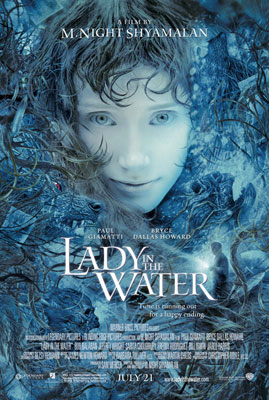
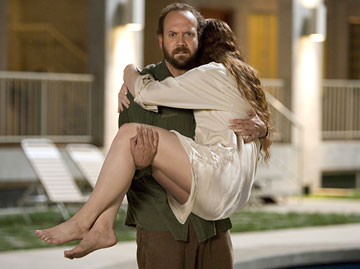 Set at a Philadelphia apartment complex, the film centers on Cleveland Heep (Paul Giamatti), a mild mannered and shy superintendent who speaks with a slight stutter, and prefers to keep to himself without getting truly close to anyone. Late one night, while investigating some strange splashes that he hears in the complex's outdoor pool area, he encounters a mysterious woman who calls herself Story (Bryce Dallas Howard). Story claims to be from a place called the Blue World, and is seeking a messenger whose words will change the world. The few details that Story is able to tell Cleveland of her world seem to match that of an Asian fairy tale that one of the complex's residents knows. It is a story of Narfs (sea nymphs) who once co-existed in our world along with humans, until people moved away from the knowledge and guidance of the Narfs.
Set at a Philadelphia apartment complex, the film centers on Cleveland Heep (Paul Giamatti), a mild mannered and shy superintendent who speaks with a slight stutter, and prefers to keep to himself without getting truly close to anyone. Late one night, while investigating some strange splashes that he hears in the complex's outdoor pool area, he encounters a mysterious woman who calls herself Story (Bryce Dallas Howard). Story claims to be from a place called the Blue World, and is seeking a messenger whose words will change the world. The few details that Story is able to tell Cleveland of her world seem to match that of an Asian fairy tale that one of the complex's residents knows. It is a story of Narfs (sea nymphs) who once co-existed in our world along with humans, until people moved away from the knowledge and guidance of the Narfs.It does indeed seem that Story is on some sort of mission that could very well shape the world. Unfortunately, there are those who wish to prevent her from completing it. There is a dangerous wolf-like grass demon lurking on the outskirts of the building called a Scrunt that will kill her if she ever steps outside of the relative safety of the apartment building. Cleveland must decipher the riddles of the fairy tale in order to help Story accomplish her goals and return to her world safely. He, and the other residents of the complex, will all play a large part in not only helping Story, but in also possibly shaping the future of our world.
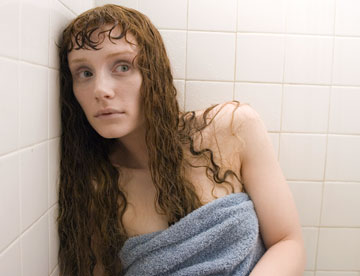 With an intriguing premise and the right amount of mystery during the film's first half hour or so, Lady in the Water is initially able to bring us under its spell and make us think that something wondrous is about to happen. The film keeps on hinting that it's all going to pay off, yet it never does. The film seems to constantly be trying to build up tension, with the glowing red eyes of the wolf demon watching the unsuspecting apartment residents from the shadows, but it never actually amounts to much of anything, and when it finally does, it arrives in an abrupt and anticlimactic ending that seems to be over in a matter of seconds. If The Village pulled the rug out from under viewers, then Lady in the Water simply teases them, not even bothering to pull the rug. It just taunts us with tantalizing ideas and imagery, and then walks away without even giving us the tiniest morsel of intrigue or interest. Besides Cleveland and Story, the rest of the cast exist for two reasons - exposition and then to mainly stand in the background and look concerned at Story. The movie tries to fool us into thinking they're playing an actual role in the story, but they are so underdeveloped and played in such broad ethnic stereotypes that we find it impossible to care about them, even when their true purpose in the story is revealed.
With an intriguing premise and the right amount of mystery during the film's first half hour or so, Lady in the Water is initially able to bring us under its spell and make us think that something wondrous is about to happen. The film keeps on hinting that it's all going to pay off, yet it never does. The film seems to constantly be trying to build up tension, with the glowing red eyes of the wolf demon watching the unsuspecting apartment residents from the shadows, but it never actually amounts to much of anything, and when it finally does, it arrives in an abrupt and anticlimactic ending that seems to be over in a matter of seconds. If The Village pulled the rug out from under viewers, then Lady in the Water simply teases them, not even bothering to pull the rug. It just taunts us with tantalizing ideas and imagery, and then walks away without even giving us the tiniest morsel of intrigue or interest. Besides Cleveland and Story, the rest of the cast exist for two reasons - exposition and then to mainly stand in the background and look concerned at Story. The movie tries to fool us into thinking they're playing an actual role in the story, but they are so underdeveloped and played in such broad ethnic stereotypes that we find it impossible to care about them, even when their true purpose in the story is revealed.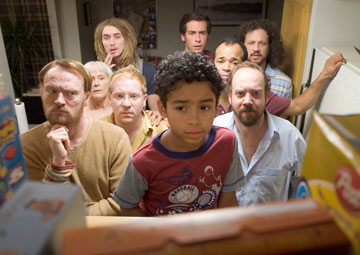 It certainly doesn't help matters that for a part of the movie, the film stops being a fantasy story, and turns into an egotistical vanity project for writer-director M. Night Shyamalan. He's had a habit of casting himself in fairly minor roles in his past films. This time, he gives himself a pretty decently sized one, and one that completely takes us out of the story, and brings forth unintentional laughter. Shyamalan plays a struggling writer who has been working on a book for years, but has given up on it. Later, Story tells him that she can see his future, and that his book is going to do great things. It is going to inspire a young boy who will become a great leader of the world. This leader will then base his teachings and his leadership of the world based on the writer's book. Okay, I find it hard to picture Mr. Shyamalan keeping a straight face while writing this, let alone deciding to cast himself as this person. What's worse, he writes the character as an almost tragic Christ-like figure who will be sacrificed, but his words will go on to inspire people and nations the world over long after his death. This is just plain egotism in its purest and rawest form. Shyamalan even decides to take some pot shots at his critics by making the one and only unlikeable person in the movie a film critic who is so grumpy and gruff, and is so set in his ideals and cynicism that he refuses to believe in things like true love or magic. Film critics are gonna have a hard time taking Shyamalan's future movies seriously after this one.
It certainly doesn't help matters that for a part of the movie, the film stops being a fantasy story, and turns into an egotistical vanity project for writer-director M. Night Shyamalan. He's had a habit of casting himself in fairly minor roles in his past films. This time, he gives himself a pretty decently sized one, and one that completely takes us out of the story, and brings forth unintentional laughter. Shyamalan plays a struggling writer who has been working on a book for years, but has given up on it. Later, Story tells him that she can see his future, and that his book is going to do great things. It is going to inspire a young boy who will become a great leader of the world. This leader will then base his teachings and his leadership of the world based on the writer's book. Okay, I find it hard to picture Mr. Shyamalan keeping a straight face while writing this, let alone deciding to cast himself as this person. What's worse, he writes the character as an almost tragic Christ-like figure who will be sacrificed, but his words will go on to inspire people and nations the world over long after his death. This is just plain egotism in its purest and rawest form. Shyamalan even decides to take some pot shots at his critics by making the one and only unlikeable person in the movie a film critic who is so grumpy and gruff, and is so set in his ideals and cynicism that he refuses to believe in things like true love or magic. Film critics are gonna have a hard time taking Shyamalan's future movies seriously after this one.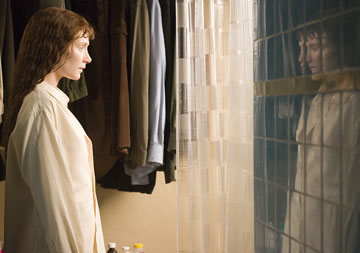 When the movie isn't boring us with its overly wordy screenplay, its bafflingly simplified conclusion, or its underdeveloped characters, it at least has a couple of good performances on display. Paul Giamatti is as good as ever as Cleveland, and is able to bring some much needed humanity to a character would have seemed less interesting in the wrong hands. Despite the flaws of how the character is written (the bonds between him and the tenants of the complex never seem quite as strong as the story wants us to believe they are), he is able to make us sympathize with the character. Bryce Dallas Howard, who was one of the few things that worked in The Village, gives an appropriately strange and almost alien performance as the mysterious Story. The movie intentionally keeps us at a distance from her and her world, so we know very little about her character. Howard meets this challenge head on, and makes the character believable and likeable without making her too personable. The rest of the cast tend to all be a blur, as they are just interchangeable ethnic stereotype cliches. The only characters who stand out are the previously mentioned gruff film critic, and a free-spirited Asian college student who mainly acts to explain the film's backstory in almost every scene she's in.
When the movie isn't boring us with its overly wordy screenplay, its bafflingly simplified conclusion, or its underdeveloped characters, it at least has a couple of good performances on display. Paul Giamatti is as good as ever as Cleveland, and is able to bring some much needed humanity to a character would have seemed less interesting in the wrong hands. Despite the flaws of how the character is written (the bonds between him and the tenants of the complex never seem quite as strong as the story wants us to believe they are), he is able to make us sympathize with the character. Bryce Dallas Howard, who was one of the few things that worked in The Village, gives an appropriately strange and almost alien performance as the mysterious Story. The movie intentionally keeps us at a distance from her and her world, so we know very little about her character. Howard meets this challenge head on, and makes the character believable and likeable without making her too personable. The rest of the cast tend to all be a blur, as they are just interchangeable ethnic stereotype cliches. The only characters who stand out are the previously mentioned gruff film critic, and a free-spirited Asian college student who mainly acts to explain the film's backstory in almost every scene she's in.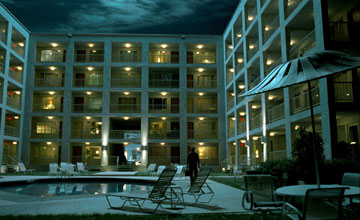
Lady in the Water has Shyamalan's typical strong visual sense, a lovely accompanying music score by James Newton Howard, and an intriguing fantasy premise that is a nice change of pace from the filmmaker's usual horror slant. Yet, none of these elements can help lift the film above its magnitude of problems that sink it like a brick. It never grabs our attention, it never does enough with its own material, and its content to just not dig deep enough into its own characters or story. I'm sure Shyamalan's defenders will be in full force, just as his critics will be in full force bashing the film. Quite frankly, I think this film is a failed experiment. I like what Shyamalan was trying to do, but he just didn't see it through to the end. It's a shame. There's a good movie lurking around in the bad one it turned out to be.
See the movie times in your area or buy the DVD at Amazon.com!






0 Comments:
Post a Comment
<< Home